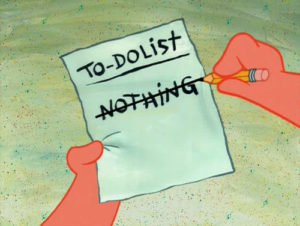Author: knhooper1967

executive
noun
a person having administrative or supervisory authority in an organization.
adjective
of, relating to, or suited for carrying out plans, duties, etc. Dictionary.com
Full disclosure, I used to be one of these Executives. I’m not going to tell you that there aren’t bad executives out there. You know the ones that are coming to trip you up or try to prove that they are a better sales rep than you are. Yes, they do exist. I’ve worked for a few of them. It’s not fun. I’m not going to tell you there aren’t people out there who have worked for me that won’t feel that way about me. You can’t be liked by everyone.
All that being said, I did try not to be THAT kind of executive. Here’s my mental encapsulation of what I was looking to do when I came to town:
- I want to meet you.
It is really that simple. You’re a name on a org chart. How emotionally involved can I get in your success if I don’t put a face to a name? I want information on how to motivate you, retain you and reward you. I need to understand who you are, for those times when you have a problem retiring quota. I need to reasonably assess whether it’s you or your territory. More importantly, when your boss is talking to me about you, I have at least a shot of having a good conversation. I’m also evaluating your manager while I’m doing this, and for that I need to know you. If we already know each other, I’m looking to learn more. Attracting and retaining talent is priority number 2 of an executive’s real job. The first is to define and communicate a vision for the future of the team. Which leads us to bullet #2.
- I want strategies.
I worked for a company once who used a fleet car. I used to call it “strategy by sitting in Ford Fusions.” As the executive I tried to be, all of my best ideas came from the field. You may not realize it but your ability to effectively communicate your experiences provides incredible value to the executive management team. It’s often not the specific detail you shared, but the idea, the notion, that golden nugget that comes through in a discussion. Of course not all suggestions are truly executable. However, don’t underestimate the value of your ideas. The discussions I’ve had in cars have led to new compensation plans, new deployment plans, new sales training, new organizations and new demand generation activities. None of these were my ideas, they all came from a someone slogging a briefcase in their territory. As you read this, try to appreciate how you can help the exec combine the simplicity of a simple chat with the farther reaching value that the dialogue provides. The best strategies are simple in concept and complex in execution. Since you can’t control everything everyone does every day, it’s much better to have an understandable and relatable strategy that people can turn into execution in their backyards. This comes from using their ideas, and getting buy in both from above (corporate management) and below (local sales management).
- I want to know what I can do to improve your productivity
It is an opportunity for you to constructively and succinctly communicate your ideas. I wanted to hear about things that take time away from being with customers. Don’t tell me that you don’t want to do paperwork or work with the CRM system. This is not an invitation to whine, unless I bring cheese (the old ones are the best). If you have an idea to make things more streamlined, feel free to share. One thing I used to do was talk about the “sanctity of the car”. I wouldn’t edit what I said when I was on the phone (so you got to listen to one side of every conversation I had and glean a few tidbits) and you could say anything you wanted, positive or negative, without repercussions. I can tell you there were times when I nearly regretted that, but they were massively outweighed by all the good ideas I got. Remember your Executive is on a number just like you. Sometimes it’s just the aggregate of you and all your peers’ numbers. Sometimes it’s a little different but either way the exec can’t be successful, unless you are. It’s a bond.
- I want to know that you can define a role for me on the sales call
As intimidating as the boss’ boss might be, he or she isn’t always the best sales rep on the team. That’s not why we got the job (or it shouldn’t be see “Differentiating Sales people” https://t.co/ArZsOq9Jil). Can we handle ourselves? You bet we can, although if I’m doing the selling, it’s costing the company way too much money to get the deal. I can probably make it up as I go along and make it look pretty smooth. However, if you need something specific like the name of a person who is key to the decision-making process, or maybe the order of certain steps, leverage my participation to find that out. Give me a role. Define that role clearly. Tell me what to do. Show me you’re in control. A great role for an executive is to open up a new opportunity either by building rapport with another executive or uncovering a project. This gets you more than a new opportunity – you might even learn something new. I love it when I get into the car and the rep starts with “So this is the way I’d like it to go down…”
On the flipside here’s what I don’t want:
- Don’t expect me to close the deal
- Don’t expect me to save a deal that is dying
- Don’t expect me to give less of discount
Of course I can do all of those thing. Just don’t wait till I’m coming to town and spring it on me. Using your executive to close a deal, save a deal or modify the financial details are all very reasonable things to ask for, even expect, but should be part of the deal pursuit. Call me and schedule the trip. Ideally this should be part of a close plan that has been developed and communicated as part of the sales Inspection process. (Hint: see https://t.co/xKCkyzc0CO)
If any of those things formulate your answer to topic number 4 above, give me a role. Just make it prescriptive and part of a plan. Do not expect miracles. They might happen, but it tells me something about you, and generally not something you want me to know.
In some of my executive jobs, I spent a lot of time with my team in the field. In others, I should have spent more. I’m human. I spent time with people who followed the first 4, mostly naturally. I spent less time with the people who focused on the second 3 even after they were told. It was pretty simple.
I hope this helps to remove some of the anxiety you feel when an executive comes to town. If you’re an executive, hopefully this will give you food for thought. With this checklist, your team should not have trouble finding things to fill your time, and get the most out of it.
Good Luck and Good Selling.
If this piece as piqued your interest, or you have an issue you’d like help with come see us at www.spectrumleap.com/contact/

“Thanks to a growing abundance of educational content resources, the average B2B buyer has completed between 50 and 90% of the buying journey by the time they make first contact with your business.”
Doesn’t that send a chill down your spine? Fighting against competition in sales goes with the territory. Product managers position products against their competition. They formulate answers to objections. They compare features and functions. They draft documents to empower sales people with information to answer all kinds of questions.
This is all extremely important. But unfortunately too often it is not enough.
If the above quote is true, then customers already have all this information. When they talk to you about competition what they are more likely doing is using you to fulfil their procurement department’s requirement to get three competitive bids.
When a customer is presented with a “must have” situation, they will use all of the information sources at their disposal to choose a product/service. So much of the buying cycle is done before they ever reach out to a sales person. They are looking for someone to help them with a placing an order. This is why sales people are so difficult to evaluate when you use only quota attainment as your metric. (See my recent posting on “Differentiating Sales People” https://t.co/ArZsOq9Jil ). Taking an order is a very, very important part of sales, but in my opinion it isn’t selling.
In the middle of the second decade of the 21st century, much of what we sell is not what would be called mission critical. It is not a “must have.” There may be consequences to not purchasing or implementing, but it’s not a “must have.”
So for everything else, where a sales person is actually involved, what are you really selling against? If your customers have ubiquitous access to competitive information and product comparison information, why are they talking to you?
They are comparing you against DOING NOTHING.
A customer is comparing a product or a service against continuing to do exactly what has put them in the position to be able to afford your product or service in the first place i.e. reasonably well to excellent. They are trying to see if they should change. Change is hard. Change management is even harder, it’s a whole profession after all.
Sales people and sales mangers increasingly need to think about this notion of “Do Nothing” as the real competitor. Like a product or a service, it has attributes against which you have to compete. Those attributes are a specific set of features but NOT at a product level. We need to compete against a vision of the future.
We need to define the customer’s vision of the future. One that is a natural progression based on the current status quo. We need to be careful that our version of the customer’s vision of the future, extrapolated from their status quo, isn’t overly negative. We need to describe what is in their head that led them to entertain the idea that your product or service might be helpful? Then we need to define our vision of the future.

Extracting the nugget of doubt that led them to entertain a meeting with you is the key to every conversation you have with the customer. Part of the challenge is to uncover the underlying issue, not just what they tell you. There is a return on investment or more accurately a “loss due to delay”. This loss is likely the source of their anxiety about the future. Uncover it, and you will be successful.
Three things to try:
- Be curious. There are many approaches to asking open ended questions but it isn’t just about asking the questions. Be genuinely curious about the answers. Get your customer talking but don’t debate. Just get the information.
- Have an opinion. IF ASKED, have an opinion based on generally available information either about your customer’s industry or the product/service area you work in. Don’t use this as an opportunity to give a product pitch.
- Uncover the decision making process. When you compete against “Do nothing”, the decision to purchase can be very different from a tradition procurement cycle. A decision making process consists of people and criteria. Do your best using number 1 and number 2 to uncover the process.(watch for an upcoming article on this)
Recently I wrote about Sales Inspection, https://t.co/xKCkyzc0CO. Much of my concern about sales inspection is that coaching in a traditional way puts all of the burden of identifying the behavior change on the sales person. When you’re competing against “Do Nothing” many of our sales people will have trouble just because they are dealing with a customer that is so much more informed than they ever have been before and their old approach will not work. Our coaching and process needs to be focused on helping our sales people navigate the new normal.
Good Luck and Good Selling.
If this piece as piqued your interest, or you have an issue you’d like help with come see us at www.spectrumleap.com/contact/

“Differentiation isn’t about corporate plots, secrecy or purges. It’s about building great teams and great companies through consistency, transparency and candor.” Jack Welch
We all talk about it. Most will say that relative evaluation is the route to building good successful teams.
Until the person is standing in front of you.
You know the person. You ate birthday cake with them. Exchanged holiday cards. Celebrated the birth of their 2nd child. Talked about dogs, cars, vacations….and now you have to judge them?
Bluebirds Land On the Good and the Mediocre
I wrote recently about a more humane way of handling the tactical sales inspection: https://goo.gl/S5JdQa. If we go down the path of treating people more humanely, why would we judge them? Isn’t everyone of value? True, everyone has value, just not the same value and not necessarily in the current context.
As any leader will tell you, it is important to apply your resources in a judicious way. Of course, this is easy. Just look at quota attainment, that’s it for sales people. Done. Finished. Nothing else to see here, move along folks.
So let’s talk about a real example.
- Sales rep is 225% of plan
- It was a profitable deal
- Sold a strategic product, i.e. something that moves the needle for the company goals above and beyond revenue
- Sold to a strategic account, a customer that was a target
- Defended from a formidable competitor
Well that was easy…But wait.
One deal sold to one account. 225% of plan. OK…. You saw a plan in Q1 for a long 9 month sales cycle that was tough and hard won. You didn’t? Q2 then? …No. It WAS forecasted right? Not till the PO came in. But you went to see the customer yourself didn’t you? Well no, was never asked and never knew about the pursuit or the deal till your financial analyst told you about it.
Oh hang on…. You remember this person now, no pipeline, no plan, very few sales calls (likes to eat lunch at this one steakhouse though). And now a closed deal that over achieves that quota by getting a call from the customer in the last few days of a budget cycle. Also there was a larger deal that the CEO was negotiating directly with your CEO. Oops…
To add insult to injury the deal came in at 11:45pm on the last day of the quarter. Frankly, the rep probably could have been replaced by a small dog with a note in its mouth and this deal would have come in anyway., The icing on the cake? You’re in front of the CFO and CEO next week to justify why anyone should be paid on the deal since no one from sales really did anything.
Awkward but as sales leaders we’ve all had something like this happen.
Perhaps this is an extreme example. The salient point remains that the rep carried the quota, likely didn’t get paid all year, and caught a lucky break. But that isn’t the discussion. You’ll do your best to get this person paid. But at 225% of quota, is this truly your best rep? Quota attainment rewards your good people, and lack of attainment is an indicator of a problem. Yet neither dictates whether a sales person is good or bad. A good and valuable sales rep can miss, and a bad rep can overachieve. So how do you define good or bad, and once the binary assessment is over, how to you rate relatively. What do you use when attainment really isn’t a good indicator of value of the individual?
Think Back to the Hiring Decision
The real trick I have found is you should evaluate people on the exact same criteria you used to hire them.
Hopefully you don’t hire sales people just because they have a list of impressive quotas on their resume. After all, even when you do a good job of checking references, quota attainment is largely self-reported. When did you ever talk to a reference that told you NOT to hire the person?
Sales people have to be personable but is likeability a good reason to hire someone. They need to be liked by their customers. People buy from people they like, or so they say. Should like-ability be the only reason you hired them? Unfortunately, not only is it the reason people hire, it’s why they promote and keep around people who should be gone.
In 2008, I co-hosted a “High Achievers Club” trip. There were 17 people who had made at least 115% of quota. By the summer of 2009, 12 of the 17 had either left or were fired for under performance. In that time period, the economy imploded. Being likeable was still a useful trait, but if it was ALL you had, you failed. When you’d been to a CIO’s house on Sunday for a barbecue celebrating their child’s birthday, what did you say on Monday when the CIO said “I don’t have budget anymore for your product”?

Developing a Success Profile
I’m not suggesting you should not use likeability or quota attainment. Instead, you need a profile of success for hiring? Have you looked at the job you want done and really figured out what it will take to achieve the company goal? Are you a startup who is less interested in profitable sales but more interested in market and mind share? Are you a mature business looking to expand? Are you a successful business that needs to fend off some competitive upstarts or a disruptive force in the market place? Hint: Is the Cloud keeping you up at night?
Start by defining the traits you think you want. Make sure those traits are measureable and will result in the type of sales you’re expecting. Likeability is hard to measure. It may be viewed as insincere and a liability with respect to today’s set of economic buyers. It’s all too easy to think about these data points as metrics of behavior. You need to define the behaviors and define the metrics you’ll use to assess execution of those behaviors that result in sales.
Building a large Rolodex, figuratively not literally, is a step on the path, not the end game. Monetizing those contacts is important and expectations need to be defined.
Now you have the list of criteria needed to be successful: hire to it, fire from it and use it to relatively evaluate your teams.
With the criteria defined, and the values are measured, you can line up your team top to bottom. Doesn’t always mean that the bottom 20% are gone, but it gives you a great insight into defining why you need them.
Good Luck and Good Selling.
If this piece as piqued your interest, or you have an issue you’d like help with come see us at www.spectrumleap.com/contact/
“People don’t do what you expect but what you inspect.”
Louis V. Gerstner, Jr. IBM CEO 1993-2002
Sales Inspection: Two words that send chills down the spine of any sales or business professional. Reps are inspected by managers, managers by directors, directors by VPs, VPs by CSO/CROs, CSO/CROs by the CEO and the CEO is inspected by the board. Everyone spends time preparing to be inspected or to inspect. Inspection, whether you’re doing or its being done to you, takes a lot of time.
If things are going well, its quick painless and cordial, mostly. If the rep is 120% of plan and is credible in their forecasts, all you’re doing is having a quick conversation. You might be checking on dates, looking for roadblocks, using the information to plan supply chain, resources etc. Simply put-you’re making sure they are doing what you expect.
For sales reps, you might think it’s easy, they are involved in the deals. For managers, who have multiple reps and are personally involved in the bigger deals, it’s easy. But again, the inspection when things are going well IS easy. When things are going well your rule about only inspecting the top 10 deals or the deals over a certain revenue threshold works fine.
Maybe you’re interested in what more might be delivered and that’s where the chill starts. You’ve called into question the credibility of the person you’re inspecting. Have they missed something, or are they working as hard as they could be? You might not intend that as the outcome but I guarantee that’s the way it’s taken. Most of the time inserting that kind of positive anxiety results in improvement, motivation and hopefully better results.
If things aren’t going so well, forecasts are slipping, values are dropping on deals, gotchas are coming up, then things get ugly. The inspector will start to ask a bunch of why questions. It’s annoying in many contexts, imagine what it’s doing to the person being inspected.
Ask yourself, even if you get a reasonable answer to the why question, what would you do with the answer? Why do you even need to know? All you’ve done, is either asked a question that the person doesn’t know the answer to, or you force them lie to you. In one, the person feels demoralized, in the other you made them push their own morals. And even if you haven’t made the person violate their own morals, is this the time to find out that you can’t trust your people?
We all know what we’re trying to do. You’re trying to get the person to change their thinking, to be innovative, to do something different. But that didn’t happen.
Let’s assume for a second that you get through the forecast inspection with everyone’s morale and morals intact, what have you really done to improve the business? You went in with a forecast of 100 which is less than the target (definition of things not going well). After asking all the questions to understand the status of the deal, at best you come out with 100. Never is 100 going to get better with this approach. Most of the time you’ll find really good reasons to reduce 100 by taking things OUT of the forecast. Your frustration and the person who is being inspected has a frustration level at an all-time high. Remember Jack Welch’s recommendation to take every opportunity to build confidence? This is the opposite.
Let’s be more positive. You’re looking down the pipeline for deals that could be “accelerated”. As an aside, do we really think if a deal is real and it is in the pipeline that our people are NOT doing everything they can to move it along? If that’s not the case should the rep be on the team? We’re looking for deals that are in early stages, that we could do something to move it quicker or faster. Note: that’s not a bad thought, let’s set that one for a bit.
However, this is not how this comes across. To the person being inspected, especially if this person is a manager, you’ve gone outside the covenant of the inspector/inspected relationship. You’ve asked a question about something they weren’t prepared to discuss. Most employees that are inspected will either try to answer by dredging from the depths of their memories, or they will feel terrible and prepare even more for the next review. They anticipate harder, longer deeper grilling next week. Is any of this really helping the cause? Do things get better because you LOOK at them more?
Most people in a reporting chain will spend more time preparing for internal calls and meetings than with customers. Yet when things get bad, what I have described invariably gets worse, and as the quarter progresses, the frequency will also go up. Once I had a forecast call at 5:00pm followed by another one at 8:00am the next morning. The best thing about that was that I was well prepared.
And, this is just the forecast call. Have you ever asked how much time people spend in preparing?
So is there a better way?
It starts with process. What if when the forecast is 100 and the target is 120, rather than focusing on 100 why not focus on 120-100, in other words.. the GAP? Your sales ops and finance people will probably be able to tell you based on history and analysis 4 weeks BEFORE the quarter starts what is likely to be the end point +- 10%. Why not listen? I know your reps and managers are going to be aggressive and optimistic, that’s their job. You have a team for a reason. Listen to all of them.
Instead:
- Spend all of your forecasting calls in the early part of the quarter, or the last ones of the previous quarter on net new opportunities and progression.
- In fact, why not look at those opportunities that are early stage and see how they could be moved now, rather than 2 months from now.
- Why not look at each stage of your sales cycle and ask what actions have moved things forward in past, and try those.
- Have a conversation, not an inspection.
- Make suggestions.
- Coach
- Work the plan with your teams, don’t try to make them come up with the answers to your questions, instead give them the answers.
- Debate the answers with your team. Instead of asking “why” questions, ask who/what questions.
If you are wrong, they will tell you. If not, you may not have a culture that allows for reps to tell managers/executives they are wrong. Subject of another posting methinks.
Inspection is an ugly concept used to change behavior. Unfortunately, it assumes that the person you’re inspecting KNOWS how to change behavior and has chosen NOT to do so. What if they simply just don’t know what to do? This might not be about skills or motivation but experience. Your team might simply not know what to do. Criticism is significantly easier than synthesis. Asking questions someone can’t answer is MUCH easier than making a suggestion of what they should do.
When I interview managers, I ask them their opnion of why a sales force wouldn’t be performing. Generally, I get “there is a lack of alignment between strategy and reward”, and some of the time they are completely right. However, to make my point I ask this question “for $500 could you jump from your chair to the moon?”. If they can’t, I say “Oh I’m sorry, let’s make it $500,000, now jump from your chair to the moon”. They usually get the point.
I know much of this flies in the face of what we were all taught to do. But then again, much of our success historically was due to refresh cycles and new products. Where is that in our world of agile SW development and the cloud? Try it, and if it doesn’t work, try something else. It’s what we do!
Good Luck and Good Selling.
If this piece as piqued your interest, or you have an issue you’d like help with, visit www.spectrumleap.com/contact/
Hi!
I’m Kevin Hooper, President and co-owner of Spectrum Leap LLC. Spectrum Leap is the culmination of my various experiences in helping many sizes of companies prosper and grow by focusing on the activities of the people who bring your products and services to your customers: THE SALES FORCE.
I have a ton of strong opinions, and in many cases, stories of how I have helped companies that have led to those opinions. Sales management: the management of the sales force, the metrics of your sales and your customers has comprised most of my career, and frankly it generally isn’t done all that well.
Most of the time that hasn’t really mattered. After all in technology we generally have had significant upgrades or releases of products every 12-18 months. Wouldn’t hammer manufacturers do really well if we all upgraded our hammers every 12 months?
But now, we deal with Cloud, Agile Software development and DevOps. When our sales people fail now, we focus on forecast calls and inspection. But what if there was another way?
Stay tuned for the discussions, the revelations and the improvement.
